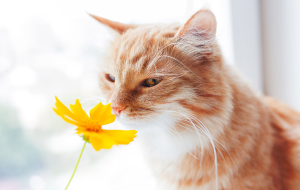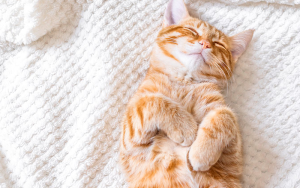Why Does My Kitten Cry So Much? A Comprehensive Guide

Introduction
A crying kitten can be a source of concern and confusion for many cat owners. Kittens have a variety of ways to communicate, and crying is one of the most prominent. Understanding the reasons behind your kitten’s excessive crying is crucial for providing
the best care and ensuring its well – being.
Instinctual and Developmental Reasons
Kittenhood Communication
- Separation from Mother and Littermates: Kittens are social animals and form strong bonds with their mother and littermates. In the early weeks of life, crying
is a way for them to communicate their needs to their mother. When separated from their mother and siblings too early, kittens may cry more as they seek the comfort and security that they used to get from their family. For example, a very young
kitten that has been adopted may cry because it misses the warmth and closeness of its mother’s body and the company of its siblings.
- Learning to Communicate: Kittens are also learning to communicate with the world around them. Crying is one of the basic vocalizations they use to express
their needs and emotions. As they grow and develop, they learn to modulate their cries depending on what they want, such as food, attention, or a comfortable place to sleep.
Hunger and Thirst
Requesting Food or Water
- Kittens have small stomachs and need to eat frequently. If your kitten is crying, it might be a sign that it’s hungry. A hungry kitten’s cry is usually persistent and high – pitched. They may also lead you to their food bowl or try to climb on you
to get your attention. Similarly, if they’re thirsty, they’ll cry to let you know they need water. Kittens should have access to fresh, clean water at all times, and a regular feeding schedule helps prevent excessive crying due to hunger.
Environmental and Discomfort Factors
Unfamiliar Surroundings
- Kittens are creatures of habit and can be sensitive to changes in their environment. A new home, new furniture, or even a new room can make them feel uneasy. The crying is a way for them to express their discomfort and seek reassurance. For example,
if you’ve just brought a kitten home, it may cry because it’s in an unfamiliar space and doesn’t know where it’s safe.
- Inadequate Shelter or Temperature: Kittens need a warm, comfortable place to sleep. If they’re too cold or don’t have a cozy place to rest, they’ll cry.
Their bedding should be soft and in a quiet, draft – free area. A cold kitten may huddle and cry, trying to find a warm spot. On the other hand, if it’s too hot, they may also be uncomfortable and vocalize their distress.
Dirty Litter Box
- Kittens are clean animals and have a strong preference for a clean litter box. If the box is dirty or has a strong odor, they may cry and avoid using it. The ammonia smell from accumulated waste can be unpleasant for them. It’s important to scoop
the litter box daily and change the litter completely at regular intervals to keep it clean and inviting for your kitten.
Attention – Seeking and Affection
Seeking Companionship
- Kittens crave attention and affection. They may cry when they want to be petted, played with, or simply have company. A lonely kitten might cry until it gets the attention it desires. For example, if you’ve been busy and haven’t interacted with your
kitten for a while, it may cry to draw you near and engage you in play or cuddling.
- Bonding with Owner: Crying can also be a way for kittens to strengthen their bond with their owners. They quickly learn that crying gets a response, and
they use it to interact with you. They might cry and then come to you, rubbing against your legs or jumping into your lap, indicating their need for closeness.
Medical Concerns
Illness or Pain
- A kitten that’s in pain or not feeling well may cry more than usual. This could be due to a variety of medical conditions, such as a respiratory infection, a tummy ache, or an injury. The crying may sound different from its normal vocalizations, perhaps
more plaintive or weak. If your kitten’s crying is accompanied by other symptoms like lethargy, loss of appetite, vomiting, or difficulty breathing, it’s important to consult a veterinarian to rule out any health problems.
How to Respond to Your Kitten’s Crying
Provide Basic Needs
- First, make sure your kitten’s basic needs are met. Check if it’s hungry or thirsty and provide food and water if needed. Ensure it has a clean litter box and a warm, comfortable place to rest.
Offer Comfort and Attention
- If your kitten is crying for attention or because it’s in an unfamiliar environment, offer comfort. Gently pet it, speak to it in a soft, soothing voice, and hold it if it seems to want closeness. You can also provide toys to distract it and engage
it in play.
Medical Check – up
- If you suspect a medical problem, don’t hesitate to take your kitten to the veterinarian. Early detection and treatment of health issues can make a big difference in your kitten’s well – being.
Conclusion
Your kitten’s crying can have multiple causes, ranging from basic needs like hunger and comfort to more serious medical concerns. By carefully observing your kitten’s behavior, the context of the crying, and any accompanying symptoms, you can better understand
what’s causing the distress and take appropriate steps to address it. With patience and proper care, you can help your kitten feel more secure and reduce excessive crying.







